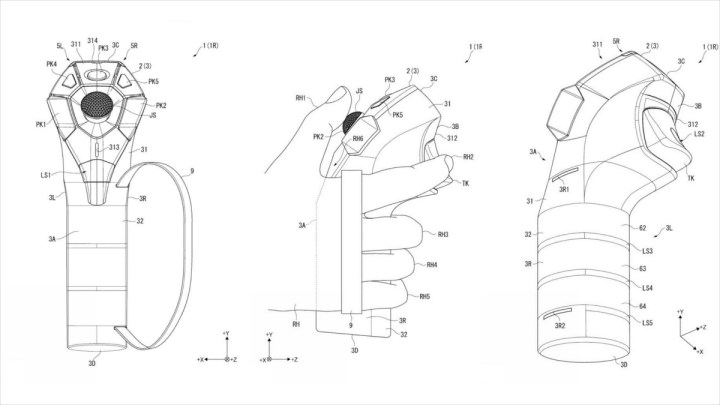
Utilizing eight-year-old technology may have made sense for keeping development costs low, but it also brings a lot of the same flaws that plagued it. The imprecise motion controls leave virtual hands shaky at their best and floating away at their worst. If two patents filed by Sony Interactive Entertainment are anything to go by, a new motion controller could be on its way.
According to VR Focus, the first patent published earlier this month showcases a new controller with an analog stick surrounded by several face buttons. Like many other motion controllers, a trigger is lying underneath. The hand strap has also been moved from the bottom the controller, now sitting alongside it. Inside the controller shows even bigger upgrades. Interlocking gears in the grip expand and contract to give players more immersive feedback “capable of imparting a tactile sense to a user.”
A second patent filed last year also details the potential of finger placement tracking. This is similar to the technology found in Valve’s prototype Knuckles controllers and the Rift’s Touch controllers. The patent makes specific reference to the controller being tracked by a head-mounted display as opposed to an external camera. This would negate the tracking issues that occur with the existing PlayStation Camera and bring it closer to the experience found with Microsoft’s Mixed Reality headsets.
While the future of PlayStation VR is not certain, it’s currently leading the high-end VR gaming market with over 2 million units sold. It’s anyone’s guess whether anything comes of these patents or not. In the past, Sony has patented many other potential VR input devices that never make it to market. With these two patents, Sony at least makes it clear that it is listening to the demands of its current audience.
Editors' Recommendations
- PlayStation trophies are finally coming to PC with new overlay
- PlayStation VR2 production reportedly paused by Sony
- PC compatibility for the PlayStation VR2 is being tested by Sony
- VR gaming lost me in 2023, and then totally won me back
- Sony’s new PlayStation earbuds are a perfect match — for my Nintendo Switch


